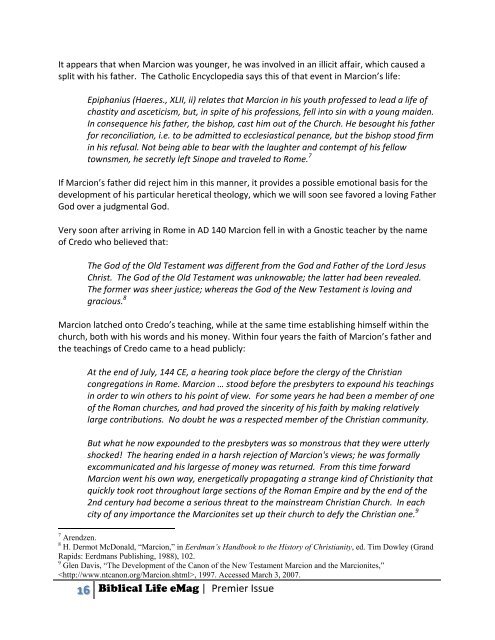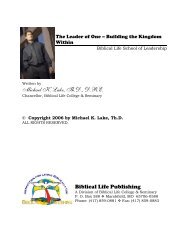Biblical Life eMag - Biblical Life College & Seminary
Biblical Life eMag - Biblical Life College & Seminary
Biblical Life eMag - Biblical Life College & Seminary
Create successful ePaper yourself
Turn your PDF publications into a flip-book with our unique Google optimized e-Paper software.
It appears that when Marcion was younger, he was involved in an illicit affair, which caused a<br />
split with his father. The Catholic Encyclopedia says this of that event in Marcion s life:<br />
Epiphanius (Haeres., XLII, ii) relates that Marcion in his youth professed to lead a life of<br />
chastity and asceticism, but, in spite of his professions, fell into sin with a young maiden.<br />
In consequence his father, the bishop, cast him out of the Church. He besought his father<br />
for reconciliation, i.e. to be admitted to ecclesiastical penance, but the bishop stood firm<br />
in his refusal. Not being able to bear with the laughter and contempt of his fellow<br />
townsmen, he secretly left Sinope and traveled to Rome. 7<br />
If Marcion s father did reject him in this manner, it provides a possible emotional basis for the<br />
development of his particular heretical theology, which we will soon see favored a loving Father<br />
God over a judgmental God.<br />
Very soon after arriving in Rome in AD 140 Marcion fell in with a Gnostic teacher by the name<br />
of Credo who believed that:<br />
The God of the Old Testament was different from the God and Father of the Lord Jesus<br />
Christ. The God of the Old Testament was unknowable; the latter had been revealed.<br />
The former was sheer justice; whereas the God of the New Testament is loving and<br />
gracious. 8<br />
Marcion latched onto Credo s teaching, while at the same time establishing himself within the<br />
church, both with his words and his money. Within four years the faith of Marcion s father and<br />
the teachings of Credo came to a head publicly:<br />
At the end of July, 144 CE, a hearing took place before the clergy of the Christian<br />
congregations in Rome. Marcion stood before the presbyters to expound his teachings<br />
in order to win others to his point of view. For some years he had been a member of one<br />
of the Roman churches, and had proved the sincerity of his faith by making relatively<br />
large contributions. No doubt he was a respected member of the Christian community.<br />
But what he now expounded to the presbyters was so monstrous that they were utterly<br />
shocked! The hearing ended in a harsh rejection of Marcion's views; he was formally<br />
excommunicated and his largesse of money was returned. From this time forward<br />
Marcion went his own way, energetically propagating a strange kind of Christianity that<br />
quickly took root throughout large sections of the Roman Empire and by the end of the<br />
2nd century had become a serious threat to the mainstream Christian Church. In each<br />
city of any importance the Marcionites set up their church to defy the Christian one. 9<br />
7<br />
Arendzen.<br />
8<br />
H. Dermot McDonald, Marcion, in Eerdman s Handbook to the History of Christianity, ed. Tim Dowley (Grand<br />
Rapids: Eerdmans Publishing, 1988), 102.<br />
9<br />
Glen Davis, The Development of the Canon of the New Testament Marcion and the Marcionites,<br />
, 1997. Accessed March 3, 2007.<br />
<strong>Biblical</strong> <strong>Life</strong> <strong>eMag</strong> | Premier Issue



